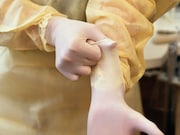Improper removal of protective equipment tied to higher risk for drug-resistant organism contamination
WEDNESDAY, April 3, 2019 (HealthDay News) — Improper removal of personal protective equipment (PPE) contaminates health care workers interacting with patients who are on contact precautions for multidrug-resistant organisms (MDROs), according to a study published online March 20 in Infection Control & Hospital Epidemiology.
Koh Okamoto, M.D., from the Rush University Medical Center in Chicago, and colleagues assessed the impact of PPE doffing errors on health care worker contamination with MDROs at four adult ICUs at a single tertiary-care teaching hospital. The 125 health care workers (66.4 percent nurses and 19.2 percent physicians) cared for 95 patients on contact precautions during the study. Samples were collected from areas of the patients’ bodies, garb sites, and high-touch environmental surfaces in patient rooms. Health care worker hands, gloves, PPE, and equipment were sampled before and after each interaction, and PPE doffing errors were observed and coded.
The researchers found that of the 5,093 cultured sites (health care worker, patient, and environment), 14.7 percent yielded the target MDRO. More than one-third of health care workers (36 percent) were contaminated with the target MDRO after patient interactions, including 3.2 percent on their hands and 30.4 percent on the PPE. Nearly four in 10 health care workers (39.2 percent) made multiple doffing errors and were more likely to have contaminated clothes after a patient interaction (risk ratio, 4.69). Doffing errors were found for all four health care workers with hand contamination. A higher risk for hand contamination was observed when gloves were removed before gowns during PPE doffing (risk ratio, 11.76).
“An intervention as simple as reinforcing the preferred order of doffing may reduce health care worker contamination with MDROs,” the authors write.
Copyright © 2019 HealthDay. All rights reserved.








